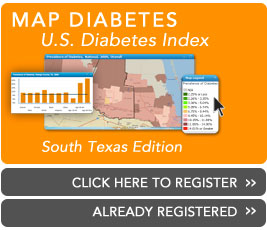Stories written by Diabetes Rio Grande
Posted by Diabetes Rio Grande
News
Thursday, August 20th, 2015
CDC, 31 March 2015
Diabetes is a disease in which blood glucose levels are above normal. Most of the food we eat is turned into glucose, or sugar, for our bodies to use for energy. The pancreas, an organ that lies near the stomach, makes a hormone called insulin to help glucose get into the cells of our bodies. When you have diabetes, your body either doesn’t make enough insulin or can’t use its own insulin as well as it should. This causes sugar to build up in your blood.
Diabetes can cause serious health complications including heart disease, blindness, kidney failure, and lower-extremity amputations. Diabetes is the seventh leading cause of death in the United States. Read more.
Posted by Diabetes Rio Grande
Minority Diabetes Reports
Thursday, August 20th, 2015
J Public Health (2014)
Background Sedentary behavior is associated with type II diabetes, though little is known about prevalence of this behavior across racial/ethnic groups or how it may contribute to disparities in diabetes prevalence. In this study, we examined the association between sedentary behavior and diabetes in a diverse data set, and explored whether differences in sedentary behavior across racial/ethnic groups could contribute to disparities in diabetes.…
Conclusions Sitting appears to be an independent risk factor for diabetes across racial/ethnic groups, though it does not appear to account for disparities in diabetes. Read more.
Posted by Diabetes Rio Grande
News
Thursday, August 20th, 2015
Diabetes Care, July 2015
Diabetes is a chronic disease that requires a person with diabetes to make a multitude of daily self-management decisions and to perform complex care activities. Diabetes self-management education and support (DSME/S) provides the foundation to help people with diabetes to navigate these decisions and activities and has been shown to improve health outcomes … . Diabetes self-management education (DSME) is the process of facilitating the knowledge, skill, and ability necessary for diabetes self-care. Diabetes self-management support (DSMS) refers to the support that is required for implementing and sustaining coping skills and behaviors needed to self-manage on an ongoing basis.… Although different members of the health care team and community can contribute to this process, it is important for health care providers and their practice settings to have the resources and a systematic referral process to ensure that patients with type 2 diabetes receive both DSME and DSMS in a consistent manner. The initial DSME is typically provided by a health professional, whereas ongoing support can be provided by personnel within a practice and a variety of community-based resources. DSME/S programs are designed to address the patient’s health beliefs, cultural needs, current knowledge, physical limitations, emotional concerns, family support, financial status, medical history, health literacy, numeracy, and other factors that influence each person’s ability to meet the challenges of self-management. Read more.
Posted by Diabetes Rio Grande
Minority Diabetes Reports
Thursday, August 20th, 2015
The Centers for Disease Control and Prevention (CDC) funds the
National Program to Eliminate Diabetes-Related Disparities in Vulnerable Populations, a five-year cooperative agreement to reduce health disparities associated with type 2 diabetes.
What Are Diabetes-Related Health Disparities?
Diabetes affects over 29 million people, or 9% of the population,
in the United States. It is the seventh leading cause of death
in the country and can cause serious health complications,
including heart disease, blindness, kidney failure, and lower-
extremity amputations. The highest rates of type 2 diabetes and
its complications exist across particular groups of the population,
such as adults 60 and older, racial and ethnic minority groups
(i.e., African Americans, Hispanic/Latino Americans, American
Indians, Native Hawaiians and other Pacific Islanders, and some
Asian Americans), and people with low socioeconomic status
and rural populations. Read more.
Posted by Diabetes Rio Grande
News
Thursday, August 20th, 2015
Rio Grande Guardian, 5 April 2015
WESLACO, RGV – Texas A&M University System believes its Healthy South Texas 2025 initiative can reduce preventable diseases by 25 percent in South Texas by the year 2025 because of the success of a smaller project in Corpus Christi.
Starr Flores, director of the Texas A&M Health Science Center Coastal Bend Health Education Center, spoke about the Corpus Christi project when she attended an event with visiting state legislators at the Texas A&M University-Kingsville Citrus Center in Weslaco.
The event at the Citrus Center, held in late January, was part of the Valley Legislative Tour hosted by the Rio Grande Valley Partnership. Read more.
Posted by Diabetes Rio Grande
News
Thursday, August 20th, 2015
Valley Morning Star, June 23, 2015
The University of Texas System aims to use social, mobile and cloud technology — with cognitive analytical tools — to develop health care delivery solutions customized for individual patients in the Rio Grande Valley. Lydia Chin, UT System’s associate vice chancellor for Health Transformations and chief innovation officer of Health Affairs for the UT System, said Project Diabetes and Obesity Control (DOC) began more than a year ago.
Chin said the system has been investing in the Rio Grande Valley with the development of the new UT Rio Grande Valley, the UTRGV School of Medicine — which is set to open in 2016 — and the South Texas Diabetes and Obesity Institute, which will bring a research team to look into the disease in the area. Read more.
Posted by Diabetes Rio Grande
News
Thursday, August 20th, 2015
Annals of Internal Medicine, 14 July 2015
Description: Community Preventive Services Task Force (Task Force) recommendation on the use of combined diet and physical activity promotion programs to reduce progression to type 2 diabetes in persons at increased risk.…
Recommendation: The Task Force recommends the use of combined diet and physical activity promotion programs by health care systems, communities, and other implementers to provide counseling and support to clients identified as being at increased risk for type 2 diabetes. Economic evidence indicates that these programs are cost-effective. Read more.



























